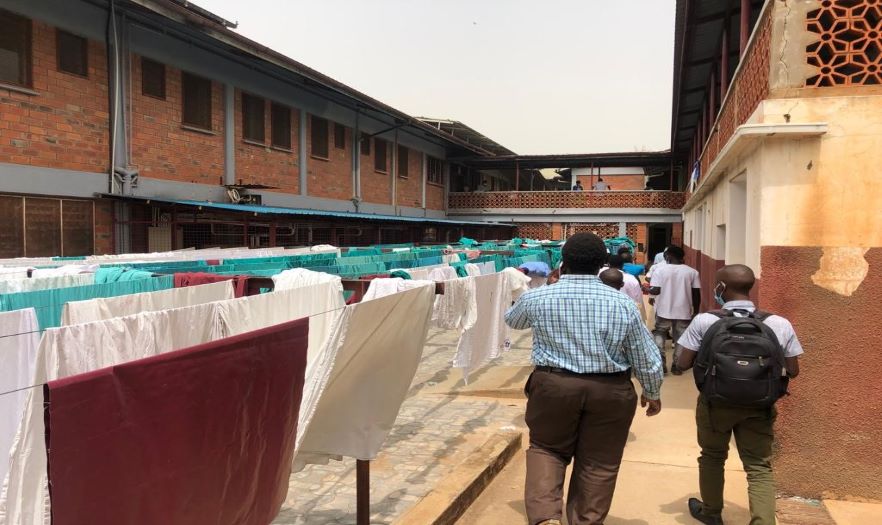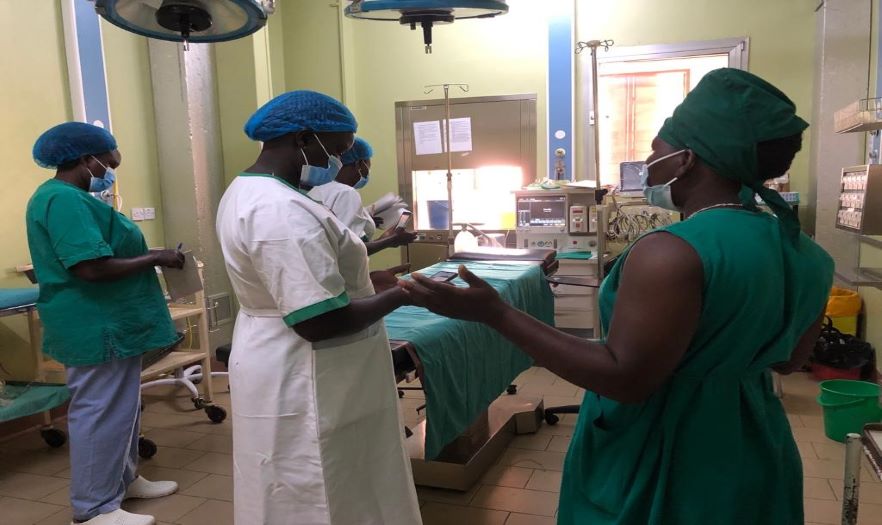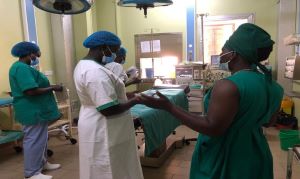The USAID MTaPS Program recently provided technical and logistical support for a peer-to-peer learning activity to develop capacity for antimicrobial resistance (AMR) control, based on the Center of Excellence (CoE) model in Uganda. This activity was in response to gaps identified during a series of trainings and aimed to provide practical learning. The focus was to transfer knowledge and skills between a high-performing host hospital and health workers from other MTaPS-supported health facilities.
Since 2019, MTaPS has built capacity to fight AMR, with a focus on infection prevention and control (IPC), antimicrobial stewardship (AMS), and multisectoral coordination. MTaPS focuses on strengthening IPC and AMS systems and structures, defining roles, and enhancing practices in facilities using standard World Health Organization recommendations. MTaPS has systematically built capacity for AMS/IPC in supported health facilities by leveraging data to inform interventions such as hand hygiene; tracking health care-associated infections; and optimizing antibiotic use in upper respiratory tract infections, urinary tract infections, and surgical antibiotic prophylaxis for IPC and AMS. St. Mary’s Hospital Lacor showed advanced capacity for both AMS and IPC in relation to those focus areas.
Based on the advancement of St. Mary’s to a CoE level, MTaPS worked with the hospital administration to support an onsite peer-peer learning activity for the other MTaPS-supported hospitals. After approval from the St. Mary’s Hospital administration, three health workers from the IPC team and three from the Medicines and Therapeutics Committee (MTC) were invited from each of the six guest facilities for this practical peer-to-peer learning.

Guest participants visiting the laundry area under the guidance of the IPC focal person at St. Mary’s Hospital. Photo credit: Grace Kwikiriza, MTaPS Uganda
The activity was spearheaded by the MTC and IPC committees of St. Mary’s Hospital. Their approach centered on involving guest health workers in the day-to-day activities of the facility under the guidance of unit charges and MTC and IPC committee members. Guest participants rotated from one unit to the next, including the theater, surgical ward, maternity ward, medical ward, pharmacy, waste treatment, and management.
The peer-peer learning focused on implementing a surgical antimicrobial prophylaxis program, post-surgical IPC and wound care, use of antibiotics in surgery, antibiotic use in the outpatient department, management of a hand hygiene program, hospital environmental management, and programmatic management of IPC and AMS programs.

Sr. Ogwen Jane (left), the theater in-charge, discussing surgical patient preparation and administration of surgical antibiotic prophylaxis with guest health workers. Photo credit: Grace Kwikiriza, MTaPS Uganda
At the end of the program, the guest and host health workers had an evaluation meeting to share feedback on the initiative. The health workers commended MTaPS for organizing the visit and pledged to disseminate their skills to peers in their facilities while abiding by the guidance imparted.
“I commend the practice that I have found here, most of my objectives for coming here have been met and some are yet to be met. We shall ensure that the MTC and IPC committees are empowered administratively so that they can perform as they should. We shall continue to network and discus on a couple of issues with the Lacor leaders of different committees to learn more from them. We need to understand their barriers to learn from them on how to overcome some pf these barriers”, said Dr. James Nyonyintono, a surgeon at Kiwoko Hospital—one of the visiting facilities and a CoE with high performance on IPC. He added, “One important lesson from this is people should know that they don’t have it all and that they should be moving out to learn from others. From this we have developed a network with Lacor that we think will be fruitful.”
The host participants also appreciated the mutual benefit of the initiative as they learned from the guests.
“From the interactions we had from the host and guest teams, we noticed gaps that we thought we didn’t have, probably we are still very poor with compliance monitoring. We have been told of things that have been happening and we did not know these things were happening”, said Dr. Alfred Okello, the IPC focal person at St. Mary’s Hospital. He added, “This has been an eye-opener to many of the host health workers and they should be open to change.”
As part of next steps, the visiting health facilities will cascade the knowledge to their hospital management teams and IPC and AMS teams and conduct hospital-based continuous medical education. Three additional areas that MTaPS will support are scheduling visits from the US Mission to the CoEs, organizing visits from the Ministry of Health and members of the National AMR sub-committee to the CoEs, and using the CoEs as learning sites for PEPFAR regional implementing partners as part of MTaPS-supported capacity building for AMR control. Through these approaches, we hope to ensure sustainability of the national AMR program through knowledge sharing and building capacity toward Joint External Evaluation 2 benchmark action 3.3: “Mandate and support IPC improvement at all healthcare facilities, recommending the use of the infection prevention and control assessment framework (IPCAF) and the WASH fit tool and antibiotic stewardship programs.”
